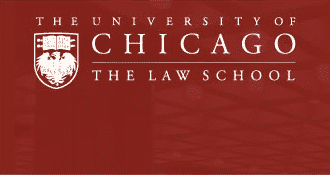
Since its beginning in the early part of the 20th century, the University of Chicago Law School has become one of the preeminent law schools in the United States especially in regards to the field of economics and the law. The law school was originally funded by John D. Rockefeller and gained prominence in the 1950’s with the founding of the Chicago School approach to antitrust law and Chicago School of economics. The most preeminent legal scholar of the 20th century–Richard Posner–was a long time professor at the University along with his notable colleague Richard Epstein. The two of them are the most cited legal scholar of the last 70 years. The school is set across from the main campus of the University of Chicago near the bank of Lake Michigan and just over 8 miles from the heart of the Chicago metropolis.
Education
Chicago Law School has migrated to a three quarter system instead of the traditional two semester academic year. In their first three quarters, students at the University of Chicago Law School take the traditional first year curriculum along with two notable additions. The first is a class in the “Elements of the Law” which emphasizes the interdisciplinary nature of law by incorporating other fields such as economics, psychology and political science. The second is a unique writing and research class known as “Bigelow” where students learn from teaching fellows who are embarking on careers in legal academia.
In their final six quarters, law students are required to completed 40 additional hours of core classes, a section of professional responsibility, at least two courses that contain a substantial writing requirement, and complete at least 8 hours of experiential learning. The 2nd and 3rd year core courses are grouped into 15 different areas of legal education and practice. The Chicago Law School also allows students to enroll in interdisciplinary, cross-listed courses from other departments.
Additional Programs
The University of Chicago Law Schools offers three advanced degrees beyond the Juris Doctor: the Masters of Laws (LL.M), the Doctor of Juridical Science (J.S.D), and the Masters of Legal Studies (M.L.S) which is a one year program for PhD students who want to compliment their study with a legal background. The LL.M program is notably small with less than 80 students and notably international with classes that usually represent over twenty international countries. The J.S.D. program allows for students to produce a dissertation under the guidance of a faculty supervisor.
The University of Chicago Law School offers three joint degrees that pair the Juris Doctor with other complimentary degrees including the MBA, a Masters of Public Policy, and a Masters of Divinity. In addition, the Law School offers a fellowship program for students pursuing a J.D. in conjunction with a PhD. Finally, The Law School has dedicated programs that allow law students to earn certificates in business leadership as well as health administration and policy.
Career and Career Placement
Within 10 months of graduation, upwards of 98% of graduates of the Chicago Law School are employed. Almost all of those students are employed in careers that require bar passage and most (60%) work in law firms. A substantial number of graduates (close to 30%) accept clerkships in the Federal court system. Graduates of the University of Chicago Law School also work across the country with most staying in the midwest but substantial portions finding careers in the Mid Atlantic region (20%) and the South Atlantic region (12%).
The Law School maintains a career services staff of over 12 persons and offers support in both private and public sector jobs as well as judicial clerkships and international opportunities. The University of Chicago Law School’s commitment to public interest careers is noteworthy. The Law School offers guaranteed financial assistance for summer clerkships in the public interest sectors as well as a generous loan forgiveness program for students who accept jobs in the public interest sector.
Experiential Learning/Distance Education
The University of Chicago Law School requires all graduates to obtain at least 8 hours of experiential education. To achieve this requirement, the Law School houses six legal clinics which are supervised by different faculty and operate as unique law firm for students to gain experiential, practical skills. The largest is the Mandel Legal Aid Clinic which offers legal advocacy in eight different practice areas. The other five clinics include innovation and exoneration clinics as well as clinics dedicated to corporate law, entrepreneurship, and appellate advocacy. The Law School also has a partnership with two off-campus clinics that satisfy the requirement for experiential learning in conjunction with a seminar taught at the Law School.
The Law School requires students to be in residence for 9 quarters and at least 10 hours per quarter while pursuing their Juris Doctor degree.
Student Life
Starting in 1959, the University of Chicago Law School is housed in a stunning building designed by the Finnish American architect Eero Saarinen. The building reflects a modernist approach to space and features of number of courtyards and alcoves that present a variety of art and open spaces. The original building has been expanded several times to incorporate space for legal clinics and student organizations.
The School is set in the southside Chicago neighborhood of Hyde Park which is a mere 15 minutes from the heart of downtown Chicago. Law Students, therefore, benefit from the unique setting of a traditional Chicago neighborhood while also having access to one of the most vibrant cities in the World.
The Law School offers a robust student life with over 60 student run organizations, three journals edited by students, and a number of yearly activities to enhance the life of law students such as weekly wine and coffee gatherings and an annual student-faculty musical.